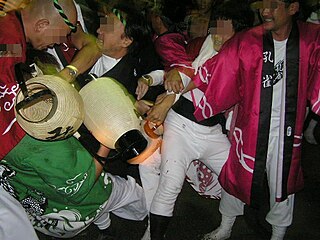Simony is the act of selling church offices and roles or sacred things. It is named after Simon Magus, who is described in the Acts of the Apostles as having offered two disciples of Jesus payment in exchange for their empowering him to impart the power of the Holy Spirit to anyone on whom he would place his hands. The term extends to other forms of trafficking for money in "spiritual things".

Pope Eutychian, also called Eutychianus, was the bishop of Rome from 4 January 275 to his death on 7 December 283.

Under the Ancien Régime, the Kingdom of France was subdivided in multiple different ways into several administrative units, until the National Constituent Assembly adopted a more uniform division into departments (départements) and districts in late 1789. The provinces continued to exist administratively until 21 September 1791.
In English history, praemunire or praemunire facias was the assertion or maintenance of papal jurisdiction, or any other foreign jurisdiction or claim of supremacy in England, against the supremacy of the monarch. The 14th-century law prohibiting this was enforced by the writ of praemunire facias, a writ of summons from which the law takes its name.
A summons is a legal document issued by a court or by an administrative agency of government for various purposes.

A consistory court is a type of ecclesiastical court, especially within the Church of England where they were originally established pursuant to a charter of King William the Conqueror, and still exist today, although since about the middle of the 19th century consistory courts have lost much of their subject-matter jurisdiction. Each diocese in the Church of England has a consistory court.
A precept is a commandment, instruction, or order intended as an authoritative rule of action.

Febronianism was a powerful movement within the Catholic Church in Germany, in the latter part of the 18th century, directed towards nationalising Catholicism, restricting the power of the papacy in favour of the episcopate, and reunion of dissident churches with the Catholic Church. Its thrust broadly corresponded to that of Gallicanism in France. Friedrich Lauchert describes Febronianism, in the Catholic Encyclopedia, as a politico-ecclesiastical system, ostensibly purposed to facilitate reconciliation of Protestant entities with the Catholic Church by curbing the Holy See's power.

Jean de Meun was a French author best known for his continuation of the Roman de la Rose.

Stanislaus Hosius was a Polish Roman Catholic cardinal. From 1551 he was the Prince-Bishop of the Bishopric of Warmia in Royal Prussia, and from 1558, he served as the papal legate to the Holy Roman Emperor's Imperial Court in Vienna, Austria. From 1566 he was also the papal legate to Poland.
The Holland Mission or Dutch Mission was the common name of a Catholic Church missionary district in the Low Countries from 1592 to 1853, during and after the Protestant Reformation in the Netherlands.
"The Summoner's Tale" is one of The Canterbury Tales by Geoffrey Chaucer.

Infamy describes a person or organization considered to have said or done something that provokes public outrage, or is considered blameworthy and so deserving of punishment even if no sanction is actually applied.
Contumacy is a stubborn refusal to obey authority or, particularly in law, the willful contempt of the order or summons of a court. The term is derived by etymologists from the Latin word contumacia, meaning "firmness" or "stubbornness".

Brawling, in law, was the offence of quarrelling, or creating a disturbance in a church or churchyard. Brawling was covered in ecclesiastic courts until 1860. It has rarely been prosecuted since then.
Ecclesiastical jurisdiction is jurisdiction by church leaders over other church leaders and over the laity.

Paraments or parements are both the hangings or ornaments of a room of state, and the ecclesiastical vestments. Paraments include the liturgical hangings on and around the altar, such as altar cloths, as well as the cloths hanging from the pulpit and lectern, and in the ecclesiastical vestments category they include humeral veils and mitres.
Cursores apostolici was the Latin title of the ecclesiastical heralds of the papal court. The office was abolished in 1968 with the motu proprioPontificalis Domus.
The historic Diocese of Utrecht was a diocese of the Latin Church of the Catholic Church from 695 to 1580, and from 1559 archdiocese in the Low Countries before and during the Protestant Reformation.








